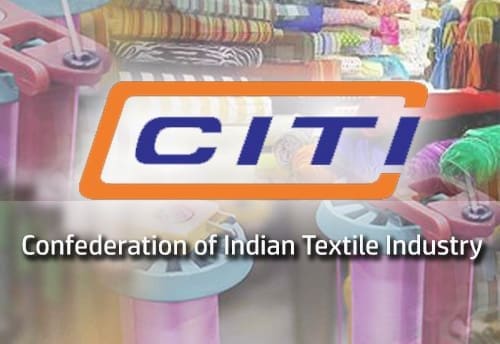New Delhi, Monday, February 01, 2021: Shri T. Rajkumar, Chairman, CITI, welcomed the first digital-cum-paperless Central Budget presented today morning by the Hon’ble Union Finance Minister, Smt. Nirmala Sitharaman, in the Lok Sabha House of the Parliament. He stated that the budget has given major emphasis to healthcare and infra sectors and whole-heartedly appreciated the Government for taking care of the entire economy and the citizens of India during this Covid-19 pandemic. The world over India has received accolades for its effective handling of this unprecedented health crises.
Chairman CITI welcomed the announcement of setting up of seven textile parks within three years under the scheme Mega Investment Textile Parks (MITRA). The parks will be set up over 1,000 acres of land with world class infrastructure, and plug-and-play facilities. This will create world class infrastructure with plug and play facilities to enable create global champions in textile exports. He further stated that the Production Linked Incentive (PLI) Scheme for manmade fibres and technical textiles with a total outlay of Rs.10,683 crores will also help the textile industry to become globally competitive, attract large investments and boost employment generation. Moreover, to achieve the target of $350 billion from the current size of $167 billion our manufacturing sector has to grow in double digits on a sustained basis. Our manufacturing companies need to become an integral part of global supply chains, possess core competence and cutting-edge technology.
Shri T. Rajkumar pointed out that that the Government well recognises the fact that our textile industry significantly contributes to the Indian economy and creates huge employment opportunities to the masses especially to the poorer sections of the society majorly covering illiterate and down-trodden women. To further enhance this scope and achieve the target of making Indian economy a $ 5-trillion economy by 2025, reduction of customs duty on caprolactam, nylon chips and nylon fiber & yarn to 5% is step in the right direction. This will bring nylon chain on par with polyester and other man-made fibers. He also welcomed rationalization of exemption on import of duty-free items as an incentive to exporters of garments, leather, and handicraft items. All these items are domestically produced in excellent quantity and quality by our MSMEs and help the textile industry and exports too.
At the same time, Chairman, CITI pinpointed that the levy of 10% import duty on cotton and cotton waste has come as a severe blow for the ailing cotton textiles and apparel industry. Cotton and cotton waste which is currently under nil rate of import duty is being subjected to 10% import duty through the budgetary announcement comprising of 5% Basic Customs Duty and another 5% Agriculture Infrastructure and Development Cess (AIDC) on cotton and 10% BCD on cotton waste. The new import duty comes into effect from 2nd February 2021.
CITI Chairman appealed to the Hon’ble Prime Minister to kindly consider the immediate withdrawal of the levy of 10% import duty on cotton and cotton waste to sustain the global competitiveness of Indian textiles & apparel industry and prevent job losses for several lakhs of people, prevent fall in the exports and also curb cheaper imports of value added products from the SAFTA countries like Bangladesh, Sri Lanka, etc.
Shri T. Rajkumar further stated that the levy of 10% duty will not benefit the cotton farmers as the normal import of 12 to 14 lakh bales per year accounts for only around 3% of Indian cotton production and consumption and such cotton is not produced in India. But this is essential to sustain the share of value added / niche markets of India both in global and domestic markets. He has added that after the introduction of BT cotton that accounts over 97% of the cotton produced in the country, the cotton textile industry has to import ELS cotton, organic cotton, contamination free cotton to the tune of 10 to 12 lakhs bales per year to meet the demands of the global customers and also the value added made-ups and apparel segments of domestic market. He has cautioned that the country is already flooded with cheaper imports of readymade garments from SAFTA countries and facing crisis.
Chairman CITI also welcomed the move of allowing women to work in all categories and also in the night-shifts with adequate protection, modified the definition of small companies: companies with a paid-up capital not exceeding 2cr & a turnover not exceeding 20cr are to be considered small companies, implementation of the 4 labour codes, minimum wages to all categories of workers, and all will be covered by the Employees State Insurance Corporation (ESIC) are welcome decisions for the upliftment of Indian economy.
Shri T. Rajkumar pointed out that in some of our major appeals we had requested to the Hon’ble Prime Minister to remove anti-dumping duty on VSF and bring uniformity in GST slab for MMF value chain to enable the MMF Sector to have a level playing field which has still remained unresolved and would keep on pitching for the same with the Government departments.
Chairman CITI concluded by saying that the outlined six pillars of proposals to strengthen the vision of Atmanirbharta, such as health and well-being, capital and infrastructure, inclusive development, reinvigorating human capital, innovation and R&D and minimum government and maximum governance will lay a strong foundation for the future growth of not only the Indian Textile & Clothing Industry but for the entire economy as well.

